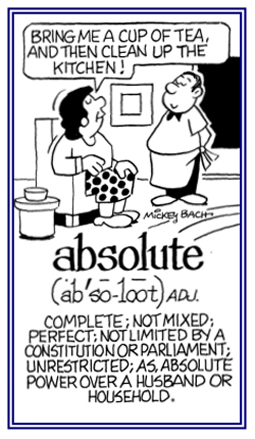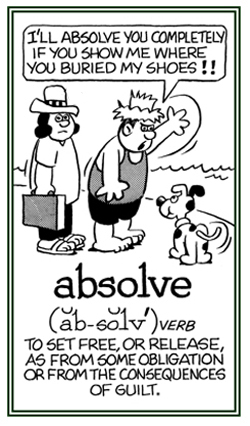solv-, -solu-, solut-, -sol, -soluble, -solubility, -solvent
(Latin: loosen, to loose; to dissolve; to untie, to set free)
2. Not limited by restrictions or exceptions; unconditional, total trust: Earl told Diane that she had his absolute confidence.
3. Unqualified in extent or degree; total: Marie could hear a pin drop in the absolute silence of the room.
4. Unconstrained by constitutional, a counterbalancing group, or other provisions, etc. in the exercise of governmental power, especially when arbitrary or despotic: James was an absolute ruler in his position as the absolute monarch.
5. Regarding something which is not to be doubted or questioned; positive, certain: The police have absolute proof of Philip's guilt.
6. Relating to units of measurement derived from fundamental units of length, mass, and time: The laboratory was supplied with the necessary equipment to determine the absolute temperature of the liquids.
7. Pertaining to the scale of a grading system based on an individual's performance considered as representing his or her knowledge of a given subject regardless of the performance of others in a group: Jessica's absolute performance during the year qualifies her for the special graduation honors.
8. Etymology: from Latin absolutus and absolvere, "to set free, to make separate".
Logically, absolute terms cannot be compared, as with "more" and "most", or used with an "intensive modifier", such as "very" or "so" because something either is complete or it is not. It cannot be "more complete" than something else, consequently sentences, such as "Mike wanted to make his record collection more complete", and "Joyce can improve the sketch by making the lines more perpendicular", are often criticized as being illogical.

Go to this Word A Day Revisited Index
for a list of additional Mickey Bach illustrations.
Craig was afflicted with absolute glaucoma during the final years of his life.
Susan asked, "Eugene, are you absolutely sure that we are on the right road and that we are not absolutely lost?"
Victor and Martin are absolutely opposed to the idea of making any additional changes.
2. An independence, completeness, and the state of being subject to no extraneous restrictions or controls; being positive and perfect.
2. Release from a duty or promise; a discharge: The soldier obtained absolution from the charges made by a fellow soldier.
Because new evidence had been discovered, Rick, the defendant, was absolved of the criminal charge.
2. To forgive someone, especially for a religious or moral fault: Mary asked the priest to please absolve her of her sins.3. To relieve a person of some kind of requirement or obligation: The court absolved Ernest of the responsibility of any further repayments of the loan.
At the board meeting that day, they agreed that they would be absolving the company of any charges of misdeeds.
Bert was absolved of having to pay his partner's debts.
4. Etymology: from Latin ab-, "from" + solvere, "to loosen".

